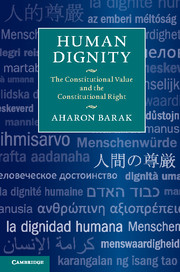Book contents
- Frontmatter
- Contents
- Preface
- Acknowledgements
- Table of Cases
- Part I Fundamental concepts and sources
- Part II Human dignity as a constitutional value
- Part III Human dignity as a constitutional right
- Part IV Human dignity in comparative law
- 11 Human dignity in American constitutional law
- 12 Human dignity in Canadian constitutional law
- 13 Human dignity in German constitutional law
- 14 Human dignity in South African constitutional law
- 15 Human dignity in Israeli constitutional law
- Bibliography
- Index
- References
11 - Human dignity in American constitutional law
Published online by Cambridge University Press: 05 February 2015
- Frontmatter
- Contents
- Preface
- Acknowledgements
- Table of Cases
- Part I Fundamental concepts and sources
- Part II Human dignity as a constitutional value
- Part III Human dignity as a constitutional right
- Part IV Human dignity in comparative law
- 11 Human dignity in American constitutional law
- 12 Human dignity in Canadian constitutional law
- 13 Human dignity in German constitutional law
- 14 Human dignity in South African constitutional law
- 15 Human dignity in Israeli constitutional law
- Bibliography
- Index
- References
Summary
The lack of a special express provision on human dignity in the federal constitution
The Constitution of the United States and the Bill of Rights within it were drafted at the end of the eighteenth century. It is therefore no wonder that no express, special provision regarding human dignity was included in it. Although the concept of human dignity was discussed in the religious and philosophical literature of that period, it did not make its way into the law at that time. The Declaration of the Rights of Man and of the Citizen (1789), a product of the French revolution, is the same age as the US Constitution, and mentions only the honor (dignités) of man, and not the richer sense of dignity which we are discussing. The appearance of human dignity in constitutions began in earnest only after the Second World War. That term was not formally expressed in the US Constitution.
Human dignity is not part of a framework right in the federal constitution
The US Constitution recognizes a number of constitutional rights designed as framework rights or mother-rights. This is the case regarding the Fifth Amendment to the Constitution, which determines:
No person shall be … deprived of life, liberty or property, without due process of law.
The Fourteenth Amendment to the Constitution determines:
Nor shall any state deprive any person of life, liberty, or property, without due process of law nor deny to any person within its jurisdiction the equal protection of the laws.
Should it not be said that the framework (or mother-) rights to life and liberty also include a derivative (or daughter-) right to human dignity at a lower level of generality? Can the constitutional right to human dignity not be found in the constitutional right to due process of law, which is interpreted as including not only procedural aspects of due process, but also the substantive aspects? The US Supreme Court decided that the constitutional right to liberty includes the constitutional right to privacy. Why should the constitutional right to liberty not include the constitutional right to human dignity as well?
- Type
- Chapter
- Information
- Human DignityThe Constitutional Value and the Constitutional Right, pp. 185 - 208Publisher: Cambridge University PressPrint publication year: 2015

